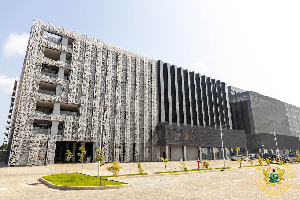Ghana is battling with the spread of a cocoa virus that has been diminishing yields, according to agricultural experts. The West African nation is the second-largest exporter of cocoa - the main ingredient in chocolate. A new variety of cocoa plant, developed in Ghana, offers hope to reduce the ill effects of the virus.
The so-called swollen-shoot virus is a major problem affecting cocoa production in Ghana, Cameroon, Nigeria and Ivory Coast.
In Ghana, an estimated 200 million cocoa trees have been destroyed by the disease in the last 50 years.
But a new cocoa plant breed, developed by Ghana's Cocoa Research Institute, is proving to be tolerant to the disease.
Kweku Abeka-Ewusi, the technical manager of the swollen-shoot virus control unit - a division of Ghana's cocoa industry regulatory body, Cocobod, says the new breed is welcomed by the farmers.
"There are two major factors which make the farmers like it - first is that it is early bearing. It takes a minimum of two years to come into fruition. It is also high yielding, with the old varieties, it will take between five to six years," he explained.
A recent survey by the Ghana Cocoa Research Institute revealed that between five to ten percent of the country's cocoa tree stock is infected with the disease. It has also spread to almost all the regions of the country, including the western region, where more than 50 percent of the country's cocoa is produced.
Abeka-Ewusi says efforts to combat the disease have been difficult and costly. He says the use of agro-chemicals to treat the virus has not been successful.
"The only effective method now is to uproot the infected tree with their contact trees," he said. "We suspect that those in contact may be harboring the disease, latent infections, we normally go over every six months to ensure that even if they harbor the disease and they are showing we retreat them, so the effort is to cut it and replant with the approved material."
Two major projects, undertaken in Ghana between 1995 and 2005, have helped to treat 64 percent of diseased farms, 82 percent of which have been rehabilitated with the new breed.
Ghana's cocoa exports for the 2005/2006 season exceeded the projected figure of 550,000 metric tons by almost 40 percent.
Experts now believe this solution could soon be applied in other West African cocoa producing countries.
General News of Thursday, 26 October 2006
Source: VOANews












